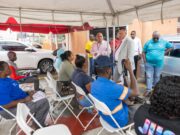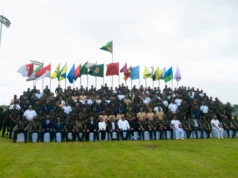Vice President Dr. Bharrat Jagdeo told the media that laws will be needed to determine what rights immigrants will have under the migration policy the People’s Progressive Party/Civic (PPP/C) government plans to roll out.
Speaking at a press conference today, Jagdeo reminded that safeguarding the country’s borders remains a key priority for the administration.
He said that the government has, for years, been stressing the need for a structured migration policy. As part of efforts to manage migration, Jagdeo noted that the government is moving ahead with the implementation of a Single Electronic Identification System (E-ID), which will see every Guyanese receiving an electronic identification card equipped with biometrics and facial recognition features. Immigrants will also be required to obtain this card.
“We’ve already started a few years back, putting together the project that is being implemented right now that will register every migrant, but also every citizen and we’ll have their biometrics,” he said.
Jagdeo explained that without the E-ID card, it would be difficult for anyone to operate in Guyana, since it will be required for key activities. He warned employers of serious consequences if their workers are found without it.
The vice president outlined that the card will be necessary to open a bank account, purchase a vehicle, or remit money, particularly for immigrants sending funds back home.
“So we’ll know everyone who is here in Guyana, who is non-Guyanese, and we’ll have all of their details. And with the cameras that we are putting in, we’re planning for about another 4,000 of those cameras that can recognize people, once we put in the biometrics there, they can identify anyone, anywhere in the country at any time,” he highlighted.
Jagdeo stressed that while the E-ID system and the camera network are important for national security, legislation must also be enacted to define immigrants’ rights.
“If they are migrants, we want people to come and work, because we need that, like on construction sites where we have shortages, but they can’t change the nature of our society. And we’ve made it clear that we would have to think about people who come here, and maybe they can have residency, but not voting rights,” he said.
He added that this issue should be debated during the constitutional reform process and at the national level. “How much rights we are prepared to accord to people who come here, given that we want to preserve our country for our people too… so that is a crucial issue,” Jagdeo further stated.











